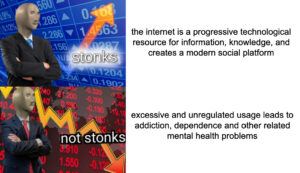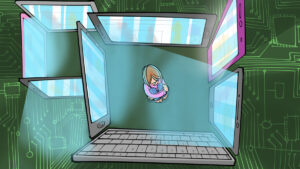I think it’s really unfortunate that I missed this week’s Zoom meeting, because I really found it informative and the discussions about theses could’ve been really good if they just had that little push in discussion.
The first 10-15 minutes were Prof. Almeida discussing the library’s website, walking us through the different sections and areas that were available to us, and talking about levels of reliance/dependability, starting from encyclopedias, to books, to newspapers, to trade magazines, to academic journals. She also revealed to us her key for research: keywords. She discussed how Google and the library website’s primary search engine covered numerous topics, and if we wanted to be specific in our research pertaining to social issues and music, we had to use specific keywords that narrowed the search to what we as writers would want to reflect. In her website exploration, I would have asked if the site included a citation program, since I was wondering if I had to do the tedious task of copying links over to third party sites that generated MLA citation, but she went over it so that works out well. The subject guides she showed us definitely looked like something that I’d make my best friend, as it had a lot of step-by-step stuff, and that kind of detail is really helpful. I saw that one of the sites listed under “Find Scholarly Articles” was JSTOR, and I briefly had flashbacks to last year when I gave up on trying to use the site after having no idea how it really worked. It was for an AP Lit paper, so I was kinda worried where to get citations from, but I figured it out and swore to limit contact with JSTOR from there on out. Despite the bad memories that resurfaced, Prof Almeida thankfully switched topics before I could start foaming at the mouth. I thought her presentation was concise, engaging and really informative, as I now know about the vast pool of resources available for me. She seemed like a nice person, and I was wondering if she’s in any way related to Laurindo Almeida (who I discussed a bit in my Media Share 1).
As for class, I really found Prof Street’s description of good texts being lists and having a narrative to be really smart, insightful and observant, because after he said that, I slowly realized that every piece of literary work I read that inspired me had that sense of narrative be effectively tied together in a subtle way that tickled my curiosity. I also liked the descriptions of a definitional thesis, as it made me realize that I made this same form of thesis for the aforementioned AP Lit paper, I just never realized it because we never had to dive into such distinctions. During the text discussions, I liked when Mehreen pointed out the lists in the first paragraph as I didn’t see it until she pointed it out; it proves that I understand narrative being crucial to good text, but also that I need to improve on sniffing narrative out. As for the part where Prof Street asked where sexual preoccupations fit into modern Internet Addiction, I would have said that it fits into the niche of people riding the surge of sexual/explicit content such as OnlyFans, Premium Snapchats, and other mediums of porn that are no longer confined to traditional porn websites. I think that with quarantine and the pandemic, most people don’t go out and have reverted back to a baser side of humanity, focusing on the baser instincts of humans, like eating, sleeping, and satisfying their more sensual predispositions. It’s kind of weird to see such a dramatic rise in both supply and demand of porn recently, and I think it ties into the addiction Prof Street discussed near the end, where he described some attitudes displayed or are related to internet addiction. Some people will be inevitably addicted to such explicit content, but hopefully such addictions regress into tamer urges.
I feel like this week’s class was a bit quiet, so I’m kinda leaning into the idea of fostering discussion, since all the juicy talking points are all in the air, and it’s fun to discuss these ideas among a group of peers.






